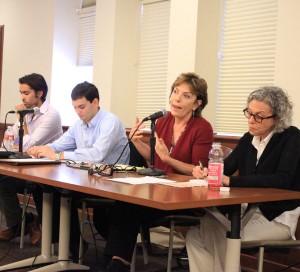Panel explores interpretation of Constitution
The USC Levan Institute for Humanities and Ethics hosted a panel Monday on contemporary constitutional issues in celebration of the 225th anniversary of the signing of the U.S. constitution.

Analysis · Law student Breck Kadaba (left), Journal of Law and Society editor Alex Fullman, Professor Rebecca Brown and moderator Lee Epstein tackled issues from Prop. 8 to Super PACs. – Ricardo Galvez | Daily Trojan
Members of the panel included Professor Rebecca Brown of the USC Gould School of Law, Breck Kadaba, a J.D. candidate at the USC Gould School of Law and Alex Fullman, editor in chief of the USC Journal of Law and Society. Lee Epstein, provost professor of law and political science and Rader Family trustee chair in law, served as a moderator for the discussion.
Some of the issues covered during the event included the recent health care law, super PACs and the issue of blind donations, content-based restrictions and the effect of freedom of speech on law and Prop. 8 in California, all in the context of where they stand constitutionally.
The constantly debated health care law was the first issue covered. Brown covered the issue by defining Congress’ powers, which most importantly in this instance include the regulation of commerce and taxes.
In her argument, Brown scrutinized the health care law from the perspective of the Constitution.
“The theory objecting to this was that when you make a person buy [health care], the status of that person before the law that takes effect is not commercial at all,” Brown said.
The next topic covered was money in politics, specifically focusing on super PACs and the recent Citizens United decision.
Fullman said that the Supreme Court’s decision in the Citizens United case, which gave corporations the right to spend independent money wherever they please without disclosure, could be harmful to elections.
“There’s a real need for disclosure. There’s a lot of dark money and that is the real threat to the integrity to our electoral system,” Fullman said.
Next, law student Breck Kadaba addressed the Supreme Court’s interpretation of the right to free speech.
Kadaba stressed the United States’ puritanical roots and its devotion, as both a country and a government, to the words and policies of the Constitution as the reason for many of these policies, especially the Supreme Court’s unwillingness to create a strict definition for free speech.
“The court doesn’t want to be the person to come down and say, ‘Well, here’s the line,’” Kadaba said.
The panelists finished the discussion with the topic of the Prop. 8 case and the constitutionality of gay marriage. Though the case has been kicked up to the Supreme Court, the justices have not yet revealed whether or not they will take the case.
The main issue in the case, according to Brown, is whether prohibiting same-sex couples from marrying could be ruled as discrimination.
“Every person in this country is entitled not to be grouped and treated more burdensomely than anyone else without a rational reason,” Brown said.
